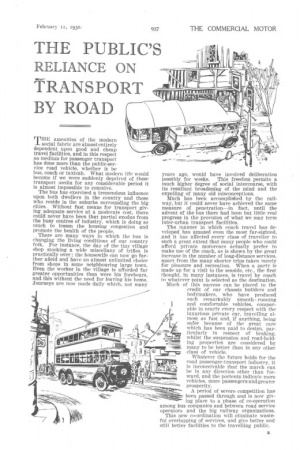HE PUBLIC'S
Page 111

If you've noticed an error in this article please click here to report it so we can fix it.
RELIANCE ON
TRANSPOR1 Y ROAD
ITIHE amenities of the modern social fabric are almost entirely dependent upon good and cheap travel facilities, and in this respect no medium for passenger transport has done more than the public-service road vehicle, whether it be bus, coach or taxicab. What modern life would become if we were suddenly deprived of these transport media for any considerable period it is almost impossible to conceive.
The bus has exercised a tremendous influence upon both dwellers in the country and those who reside in the suburbs surrounding the big cities. Without fast means for transport giving adequate service at a moderate cost, there could never have been that partial exodus from the busy centres of Industry, which Is doing so much to lessen the housing congestion and promote the health of the people. There are many ways in which the bus is changing the living conditions of our country folk. For instance, the day of the tiny village shop stocking a wide miscellany of trifles is practically over ; the housewife can now go farther afield and have an almost unlimited choice from shops in some neighbouring large town. Even the worker in the village is afforded far greater opportunities than were his forebears. and.this without the need for leaving his home. Journeys are now made daily which, not many years ago, would have involved deliberation possibly for weeks. This freedom permits a much higher degree of social intercourse, with Its resultant broadening of the mind and the expelling of many old misconceptions. Much has been accomplished by the railway, but it could never have achieved the same measure of penetration—in fact, until the advent of the bus there had been but little real progress in the provision of what we may term inter-urban transport facilities. The manner in which coach travel has developed has amazed even the most far-sighted, and it has affected every class of traveller to such a great extent that many people who could afford private motorcars actually prefer to make use of the coach, as is shown by the great increase in the number of long-distance services, apart from the many shorter trips taken nurely for pleasure and recreation. When a party is made up for a visit to the seaside, etc., the first thought, in many instances, is travel by coach to whatever point is selected as the destination.
Much of this success can be placed to the credit of our chassis builders and bodymakers, who have produced such remarkably smooth running and comfortable vehicles, comparable in nearly every respect with the luxurious private car, travelling almost as fast and, if anything, being safer because of the great care which has been paid to design, particularly in respect of braking, whilst the suspension and road-holding properties are considered by many to be better than in any other class of vehicle.
Whatever the future holds for the road passenger-transport industry, it is inconceivable that the march can be in any direction other than forward, and the portents indicate more vehicles, more passengers and greater prosperity.
A period of severe competition has been passed through and is now giving place to a phase of co-operation among bus companies and between road service operators and the big railway organizations. This new co-ordination will eliminate wasteful overlapping of services, and give better and still better facilities to the travelling public.




























































































































































































































